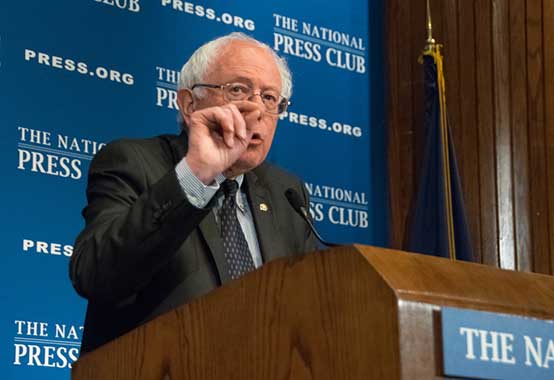Previewing the First Democratic Debate

The first Democratic presidential debate will air on CNN this evening at 9:00 Eastern. All of the declared candidates will be participating (except for Larry Lessig), which will leave us with the front-runner Hillary Clinton and her four challengers. The two-hour debate will probably not tell us very much, but it will raise the profile of Clinton’s challengers and give them an opportunity to criticize her record. She is especially vulnerable on foreign policy, and several of her opponents are in a good position to take advantage of that. Whether they make use of that opportunity remains to be seen, but it would be a way to hit Clinton where she is supposedly strongest.
Clinton’s main competitor to date has been Vermont Independent Sen. Bernie Sanders, who has lately been making a little more noise about his opposition to the Iraq war and Clinton’s support for it. In the last week, Clinton has positioned herself as the only Democratic candidate in favor of a “no-fly zone” in Syria. This is a reckless and crazy position to take, especially in light of Russia’s recent intervention, and it pits her against Sanders and former Maryland Gov. Martin O’Malley, both of whom have publicly come out against the idea. O’Malley went so far as to say that “Secretary Clinton is always quick for the military intervention,” which has the virtue of being both true and also damaging to Clinton with many Democratic voters.
Former Virginia Sen. Jim Webb has the distinction of being one of the only national figures to oppose both the Iraq and Libyan wars publicly, and that puts him in a good position to attack Clinton’s record on both wars. As far as I know, he has taken no public position on a “no-fly zone” in Syria since he announced his candidacy, but presumably he would be opposed to any deeper involvement in that country’s civil war. His effectiveness as a critic of Clinton’s foreign policy is undermined by his opposition to the nuclear deal, which all of the other candidates support, but he will still have a chance to make a favorable impression on Democratic voters that don’t trust Clinton’s judgment. Former Rhode Island Senator and Governor Lincoln Chafee is running principally as an antiwar candidate, but to the best of my knowledge he has almost nothing to say about contemporary foreign policy issues. He is pleased to remind people that he was then the only Republican member of the Senate to vote against authorizing the Iraq war, but other than that he seems to have virtually nothing to say about these issues. He ought to be well-positioned to challenge Clinton on her record, but he has so little to say about the wars the U.S. is currently fighting or the wars that our government may be fighting in the future that his criticisms aren’t going to gain much traction.
The Democratic field is largely supportive of the war on ISIS, and as far as I can tell none of the candidates has anything to say one way or the other about the U.S. role in the war on Yemen. I expect them to offer boilerplate rhetoric on the former and to be asked nothing about the latter. The trouble with the Democratic field is that none of the candidates has consistently opposed U.S. military interventions. Sanders essentially endorses administration policy in Syria, but doesn’t favor a more aggressive approach, and even the most antiwar candidates are not speaking out against current U.S. wars. That will make it a bit easier for Clinton to deflect criticisms from her challengers and to obscure her record of reflexive hawkishness.
Comments